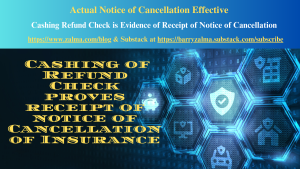Actual Notice of Cancellation Effective

Post 4863
See the full video at https://rumble.com/v5cumed-actual-notice-of-cancellation-effective.html and at https://youtu.be/o44RIj8RfFs
The Supreme Court of North Carolina considered whether Nationwide effectively canceled plaintiffs’ fire insurance policy before their house burned down. Almost two months before that tragic fire, Nationwide mailed plaintiffs a letter explaining when and why it was terminating their coverage. The cancellation date came and went. Afterwards, Nationwide sent plaintiffs a check listing their policy number and refunding the excess premium.
In Nung Ha and Nhiem Tran v. Nationwide General Insurance Company, No. 312A19-2, Supreme Court of North Carolina (August 23, 2024) Plaintiffs contend-and the trial court found-that they never saw the cancellation letter. But they received, signed, and cashed the refund check over a month before the fire.
BACKGROUND
Plaintiffs Nhiem Tran and Nung Ha have one daughter and three sons. In 2010, plaintiffs moved into a house in Wake Forest, North Carolina.
On 1 April 2015, Mr. Tran filled out an online insurance application after an AAA Insurance policy was cancelled. Mr. Tran arranged for Nationwide to withdraw monthly premiums from his checking account. He later logged into Nationwide’s web portal and signed the policy electronically. Nationwide issued that policy subject to an underwriter’s review.
NATIONWIDE CANCELS PLAINTIFFS’ POLICY
Nationwide dispatched an underwriter to inspect plaintiffs’ property. That inspection unearthed many of the same hazards logged by the previous insurer, AAA- rotten siding, an unfenced swimming pool, and an unsecured trampoline. The latter two conditions were classified as “gross hazards.” Citing those concerns, Nationwide-like AAA-chose to cancel plaintiffs’ policy. The company then mailed plaintiffs a notice of cancellation on 22 May 2015 by first-class mail. The letter listed the three hazards prompting the cancellation. It also explained that plaintiffs’ policy would end on 6 June 2015 unless they fixed the identified risks.
Plaintiffs did not contact Nationwide, and so the company terminated their policy on 6 June 2015-fifteen days after mailing the cancellation letter. According to plaintiffs, they never received that letter. However, everyone agreed that after Nationwide ended plaintiffs’ coverage, it stopped withdrawing monthly premium payments from their bank account.
While funds were withdrawn at the beginning of April, May, and June, plaintiffs did not pay for insurance in July. Two days after the cancellation date, Nationwide mailed plaintiffs a check refunding the excess premium paid for June. The check prominently listed the policy number. Plaintiffs endorsed and cashed that check on 17 June 2015.
On the evening of 24 July 2015, plaintiffs were at church when their home caught fire. The entire structure burned down, consuming the family’s belongings. Plaintiffs later filed a claim with Nationwide-the company rejected it, contending that plaintiffs’ insurance expired before the fire.
ANALYSIS
Insurance companies may cancel insurance policies by: “[G]iving to the insured a five days’ written notice of cancellation with or without tender of the excess of paid premium above the pro rata premium for the expired time, which excess, if not tendered, shall be refunded on demand. Notice of cancellation shall state that said excess premium (if not tendered) will be refunded on demand.”
As the Supreme Court explained almost a century ago, statutory notice requirements are manifestly for the protection of the insured. Mindful that the General Assembly designed notice provisions to give insureds a meaningful chance to avoid coverage lapses. The Supreme Court has explained that the manner in which notice is given is of secondary importance-it is the fact of notice that matters.
In general terms, a person has actual notice when the information “given directly to” imparts clear knowledge of a fact or condition with legal significance. Because Nationwide gave plaintiffs the timely forewarning required by statute it properly canceled their policy.
Though plaintiffs deny receiving Nationwide’s cancellation letter, they were armed with clear knowledge and advanced warning of their policy’s termination. Plaintiffs had actual notice of cancellation and Nationwide duly ended their insurance before the fire.
The Supreme Court found actual knowledge of cancellation because two days after their policy was terminated, Nationwide sent plaintiffs a check refunding the excess premium. Plaintiffs not only received that check, but personally signed and cashed it. The check clearly listed plaintiffs’ policy number. And the amount of the refund equaled the June premium, less the window of coverage until the cancellation date on 6 June 2015.
Continuing to focus on substance over form, the Supreme Court held that plaintiffs had advanced warning of cancellation and were armed with the information necessary for their protection. Because the manner in which notice is given is of secondary importance when clear evidence shows an insured’s actual notice the analysis began and ended with plaintiffs’ direct and palpable knowledge of their policy’s expiration.
Because Nationwide canceled plaintiffs’ coverage well before 24 July 2015, their policy was not in place at the time of the tragic fire.
The plaintiffs had been cancelled by AAA for the poor and dangerous condition of their property. They did nothing to change the condition and applied for insurance from Nationwide. Nationwide inspected the property and found the same defects that prompted AAA to cancel and did the same. Even if the insureds failed to see the cancellation notice, as they claimed, by cashing the refund check, they had actual notice of the cancellation. If they did not tell Nationwide about the reasons for AAA’s cancellation they had 3 months of insurance until Nationwide inspected the property and cancelled.
 (c) 2024 Barry Zalma & ClaimSchool, Inc.
(c) 2024 Barry Zalma & ClaimSchool, Inc.
Please tell your friends and colleagues about this blog and the videos and let them subscribe to the blog and the videos.
Subscribe to my substack at https://barryzalma.substack.com/subscribe
Go to X @bzalma; Go to Newsbreak.com https://www.newsbreak.com/@c/1653419?s=01; Go to Barry Zalma videos at Rumble.com at https://rumble.com/account/content?type=all; Go to Barry Zalma on YouTube- https://www.youtube.com/channel/UCysiZklEtxZsSF9DfC0Expg
Go to the Insurance Claims Library – https://lnkd.in/gwEYk
Like this:
Loading…







